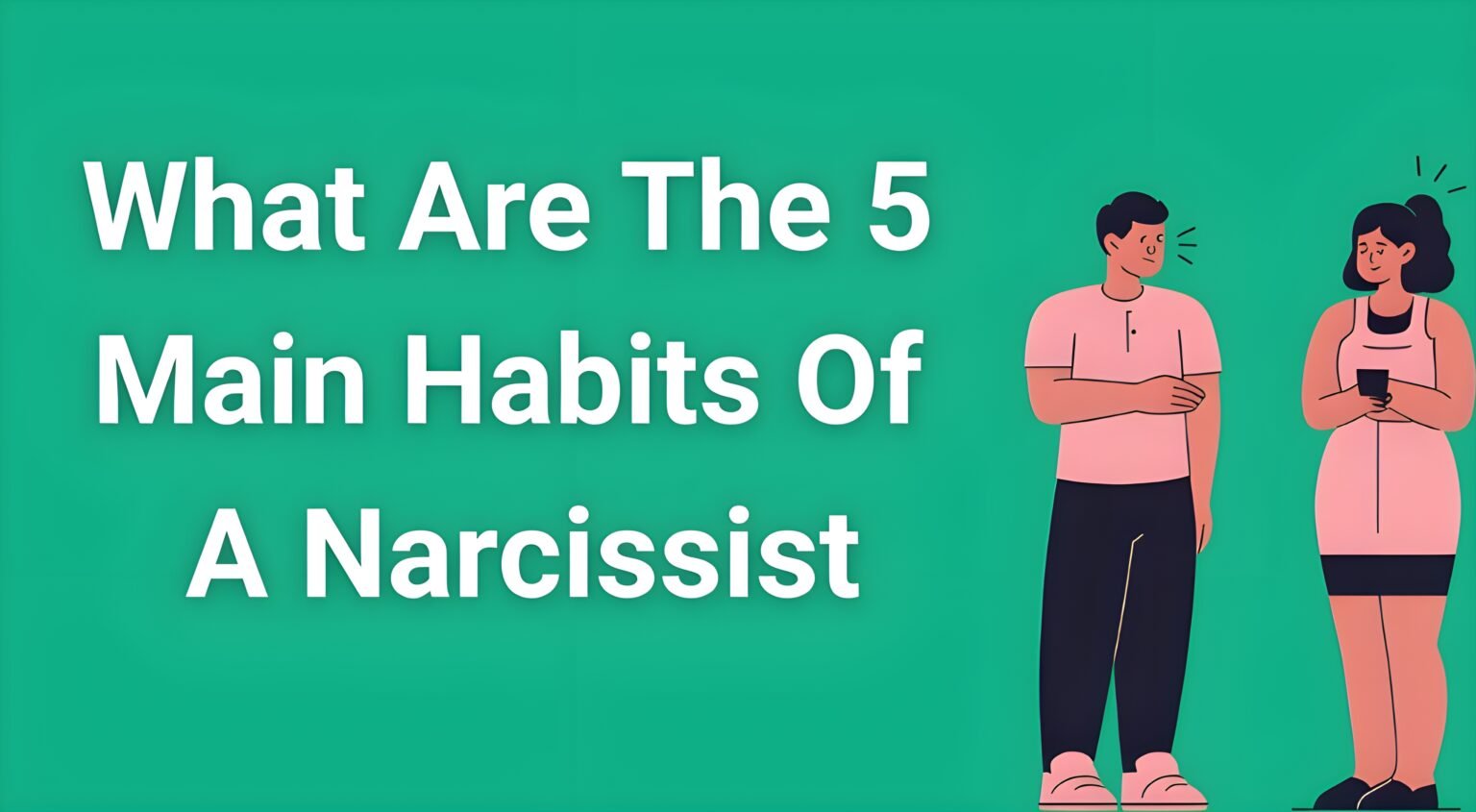Do you find yourself constantly questioning your own memories, apologizing for things that weren’t your fault, or walking on eggshells around someone you love? You’re not losing your mind—you might be dealing with someone who exhibits the classic habits of a narcissist.
- The Science Behind Narcissistic Behavior Patterns
- Habit #1: Grandiose Self-Importance and Reality Distortion
- Habit #2: Pathological Need for Constant Admiration and Validation
- Habit #3: Complete Lack of Empathy and Emotional Exploitation
- Habit #4: Manipulative Control and Boundary Violations
- Habit #5: Rage, Entitlement, and Lack of Accountability
- The Cumulative Impact: Why These Habits Destroy Lives
- Red Flags: Early Warning Signs of Narcissistic Habits
- Frequently Asked Questions
- Conclusion: Reclaiming Your Reality
Understanding what are the 5 main habits of a narcissist isn’t just academic knowledge; it’s essential survival information that could save your sanity, your relationships, and even your sense of self. These behavioral patterns are so consistent across narcissistic individuals that recognizing them early can protect you from years of psychological damage.
The reality is harsh but necessary to understand: narcissistic behavior creates a systematic breakdown of your reality, leaving you confused, isolated, and questioning everything you once knew to be true. But knowledge is power, and by the end of this article, you’ll have the tools to identify these destructive patterns and reclaim your peace of mind.
The Science Behind Narcissistic Behavior Patterns
Before diving into the specific habits, it’s crucial to understand that narcissistic personality traits exist on a spectrum. While not everyone displaying these behaviors has Narcissistic Personality Disorder (NPD), the impact on relationships and victims remains devastatingly real.
Recent studies show that approximately 1-6% of the general population exhibits narcissistic personality traits, but the damage extends far beyond these numbers. Each narcissistic individual typically affects multiple people throughout their lifetime—family members, romantic partners, colleagues, and friends—creating a ripple effect of psychological trauma.
What makes these habits particularly insidious is their systematic nature. These aren’t random acts of selfishness or occasional bad behavior. Instead, they form a calculated pattern designed (often unconsciously) to maintain control, extract admiration, and protect the narcissist’s fragile ego at any cost.
Habit #1: Grandiose Self-Importance and Reality Distortion
The first and perhaps most recognizable habit of a narcissist is their inflated sense of self-importance. This goes far beyond healthy confidence or self-esteem—it’s a fundamental distortion of reality that affects every interaction they have.
How This Habit Manifests:
Exaggerated Achievements: They consistently embellish or fabricate accomplishments, often claiming credit for work they didn’t do or experiences they didn’t have. You might notice them telling different versions of the same story, each more impressive than the last.
Superiority Complex: They genuinely believe they’re more intelligent, attractive, successful, or valuable than others. This isn’t just outward bragging—they’ve convinced themselves of their superiority and expect others to recognize and defer to it.
Fantasy-Based Thinking: Much of their self-image is built on fantasies of unlimited success, power, brilliance, or ideal love. They spend considerable mental energy maintaining these delusions rather than dealing with reality.
The Reality-Questioning Effect:
When you’re close to someone with this habit, you begin to question your own perceptions. They speak with such conviction about their superiority that you start wondering if you’re missing something obvious. This is particularly damaging because it trains you to doubt your own judgment—a perfect setup for further manipulation.
Sarah, a survivor of narcissistic abuse, describes this phenomenon: “My ex would tell me about his ‘connections’ and ‘deals’ that never materialized. When I questioned inconsistencies, he’d make me feel stupid for not understanding his ‘complex business strategies.’ I started believing I wasn’t smart enough to grasp his brilliance.”
The Deeper Psychology:
This grandiosity serves as a protective shell around profound insecurity and shame. The narcissist’s self-worth is so fragile that they’ve constructed an elaborate false self to protect against the terror of being seen as ordinary or flawed. Understanding this doesn’t excuse the behavior, but it explains why this habit is so persistent and resistant to change.
Habit #2: Pathological Need for Constant Admiration and Validation
The second defining habit of a narcissist is their insatiable hunger for admiration, praise, and validation from others. This isn’t simply wanting to be liked—it’s a desperate, compulsive need that drives much of their behavior and decision-making.
How This Habit Shows Up:
Attention-Seeking Behaviors: They consistently steer conversations back to themselves, interrupt others to share their own stories, and become visibly uncomfortable when not the center of attention. Even in inappropriate settings like funerals or others’ celebrations, they find ways to redirect focus.
Fishing for Compliments: They make self-deprecating comments not from genuine humility, but as bait for reassurance and praise. Phrases like “I probably look terrible today” or “I’m not sure I’m any good at this” are designed to elicit contradictory responses.
Social Media Obsession: Their online presence becomes a carefully curated highlight reel designed to generate likes, comments, and admiration. They may post excessively, become upset by lack of engagement, or delete posts that don’t receive sufficient attention.
Competitive Behavior: Every interaction becomes an opportunity to demonstrate superiority. They can’t simply enjoy others’ successes—they must either diminish them or redirect attention to their own achievements.
The Exhausting Reality for Loved Ones:
Being in a relationship with someone who has this habit is emotionally exhausting. You become responsible for maintaining their ego through constant praise and validation. Any failure to provide sufficient admiration is met with anger, withdrawal, or punishment.
The particularly cruel aspect is that no amount of validation is ever enough. Like feeding a black hole, the more attention and admiration you provide, the more they demand. This creates an impossible situation where you’re constantly performing emotional labor while receiving little genuine appreciation or reciprocal attention.
The Manipulation Cycle:
This habit creates a powerful manipulation cycle. When you provide the admiration they crave, you’re rewarded with temporary kindness and attention (intermittent reinforcement). When you fail to meet their validation needs, you face emotional punishment. Over time, this conditions you to prioritize their needs over your own, gradually erasing your sense of self in the process.
Habit #3: Complete Lack of Empathy and Emotional Exploitation
Perhaps the most damaging habit of a narcissist is their profound inability to genuinely empathize with others’ experiences, feelings, or needs. This isn’t simply being self-centered—it’s a fundamental inability to recognize and respond appropriately to others’ emotional states.
How This Empathy Deficit Appears:
Emotional Blindness: They seem genuinely confused or annoyed when others express hurt, sadness, or distress. Responses like “You’re being too sensitive” or “I don’t understand why you’re upset” aren’t necessarily manipulation—they often reflect a genuine inability to comprehend others’ emotional experiences.
Transactional Relationships: Every interaction is viewed through the lens of “What do I gain from this?” They struggle to understand why someone would help others without expecting something in return, leading to suspicion and paranoia in their relationships.
Inability to Provide Comfort: When you’re going through difficult times, they either dismiss your feelings, make it about themselves, or become irritated by your “neediness.” The emotional support that healthy relationships provide simply doesn’t exist.
Using Others’ Vulnerabilities: Information you share during vulnerable moments becomes ammunition for future conflicts. They remember your fears, insecurities, and traumas not to understand you better, but to use against you when it serves their purposes.
The Devastating Impact on Victims:
This lack of empathy creates a profoundly lonely experience for anyone close to a narcissist. You find yourself constantly explaining why certain behaviors hurt you, only to face blank stares or irritation. Over time, you begin to question whether your feelings are valid or reasonable.
The isolation becomes complete when you realize that the person who should care most about your wellbeing is fundamentally incapable of doing so. This realization often leads to a profound sense of existential loneliness—being emotionally alone even when in a relationship.
The Cognitive vs. Emotional Empathy Distinction:
Some narcissists display what psychologists call “cognitive empathy”—they can intellectually understand that their actions affect others and even predict emotional responses. However, they lack “emotional empathy”—the ability to actually feel concern or distress about others’ suffering. This combination makes them particularly skilled manipulators, as they can understand emotional buttons without being motivated by genuine care.
Habit #4: Manipulative Control and Boundary Violations
The fourth habit involves the narcissist’s compulsive need to control their environment and the people in it. This control is maintained through sophisticated manipulation techniques that often operate below the conscious awareness of their victims.
Control Mechanisms and Manipulation Tactics:
Gaslighting: This involves systematically making you question your memory, perception, and sanity. They’ll deny saying things you clearly remember, insist events happened differently, or claim you’re “imagining things” or “being too sensitive.” Over time, this erosion of reality testing leaves you dependent on their version of events.
Financial Control: They may restrict access to money, hide financial information, create financial dependencies, or use money as a weapon to control behavior. This can range from subtle control to overt financial abuse, but it always serves to limit your independence and options.
Social Isolation: They gradually separate you from friends and family through criticism (“Your friends don’t really care about you”), scheduling conflicts (“We can’t see them, we have plans”), or creating drama that makes social interactions uncomfortable. This isolation makes you more dependent on them and removes potential sources of reality-testing.
Information Control: They control what information you have access to, from monitoring your communications to lying about events or conversations. This keeps you operating with incomplete or false information, making it difficult to make informed decisions about your life.
Emotional Manipulation: They use your emotions against you through guilt trips (“After everything I’ve done for you…”), threats of abandonment (“Maybe you’d be happier without me”), or emotional blackmail (“If you loved me, you would…”).
The Gradual Erosion of Autonomy:
What makes this habit particularly insidious is its gradual implementation. Healthy boundaries are eroded slowly over time, with each violation normalized before the next begins. By the time victims recognize the extent of control, they often feel too confused, isolated, or financially dependent to easily leave.
The manipulation is often disguised as care or concern. Statements like “I’m just trying to protect you” or “I know what’s best for you” mask controlling behavior as love, making it difficult to recognize and resist.
Trauma Bonding and Addiction Cycles:
This controlling behavior creates what psychologists call “trauma bonding”—a psychological phenomenon where intermittent reinforcement (periods of kindness followed by abuse) creates a powerful psychological addiction. The unpredictable nature of when kindness will come creates a dopamine-driven cycle that can be literally addictive.
Understanding this biochemical component helps explain why leaving feels so difficult and why willpower alone often isn’t enough to break free from narcissistic relationships.
Habit #5: Rage, Entitlement, and Lack of Accountability
The final habit encompasses the narcissist’s explosive anger when their expectations aren’t met, combined with a profound sense of entitlement and an inability to take genuine responsibility for their actions.
How This Habit Manifests:
Narcissistic Rage: When faced with criticism, boundaries, or situations that challenge their self-image, narcissists often explode into disproportionate anger. This rage serves multiple purposes: it punishes those who dare challenge them, creates fear that prevents future challenges, and allows them to avoid dealing with uncomfortable truths about themselves.
Entitlement Mentality: They genuinely believe rules don’t apply to them and that they deserve special treatment in all situations. This shows up as cutting in lines, expecting preferential treatment, becoming outraged when faced with consequences, or believing they should be exempt from normal social expectations.
Blame Shifting: Nothing is ever their fault. When confronted with evidence of wrongdoing, they deflect blame onto others, circumstances, or external factors. Common phrases include “You made me do it,” “If you hadn’t…” or “I wouldn’t have had to if you…”
False Apologies: When forced to apologize, their apologies lack genuine remorse and often include justifications, blame-shifting, or conditions. “I’m sorry you feel that way,” “I’m sorry, but…” or “I apologize if I hurt your feelings, but you need to understand…” are non-apologies that maintain their position while appearing to take responsibility.
The Cycle of Abuse and “Hoovering”:
This habit creates a predictable cycle: buildup of tension, explosive rage or punishment, followed by a “honeymoon period” where they may offer gifts, affection, or promises to change. This cycle keeps victims off-balance and hoping for a return to the good times.
When victims attempt to leave or establish boundaries, narcissists often engage in “hoovering”—named after the vacuum cleaner brand—where they attempt to suck their victims back into the relationship through promises of change, declarations of love, or even threats of self-harm.
The Psychological Trap:
This final habit creates a powerful psychological trap. Victims often feel responsible for the narcissist’s emotions and behavior, believing that if they could just be more understanding, loving, or patient, the relationship could work. The intermittent moments of kindness and the narcissist’s promises to change maintain hope that keeps victims engaged long past the point when they should leave.
The lack of accountability also means that problems are never truly resolved. Issues resurface repeatedly because the underlying dynamics never change, creating a groundhog-day effect that slowly erodes the victim’s sanity and self-worth.
The Cumulative Impact: Why These Habits Destroy Lives
Understanding what are the 5 main habits of a narcissist isn’t just academic—it’s about recognizing the systematic destruction these patterns create. When combined, these habits form a perfect storm that dismantles victims’ sense of reality, self-worth, and autonomy.
The Psychological Aftermath:
Complex PTSD: Extended exposure to narcissistic abuse often results in Complex Post-Traumatic Stress Disorder, characterized by emotional dysregulation, negative self-concept, and interpersonal difficulties that can persist long after the relationship ends.
Decision-Making Paralysis: After having their judgment consistently undermined, victims often struggle to make decisions, constantly second-guessing themselves and seeking external validation for choices they previously made confidently.
Hypervigilance and Anxiety: Living in a constant state of emotional threat creates lasting anxiety and hypervigilance. Survivors often struggle with insomnia, panic attacks, and an inability to relax even in safe environments.
Identity Loss: The systematic erosion of personal preferences, opinions, and autonomy often leaves survivors unsure of who they are outside the relationship. They may struggle to remember what they enjoyed, valued, or wanted before the narcissistic influence.
Breaking Free: The Path to Recovery
Recovery from narcissistic abuse requires more than simply leaving the relationship—it requires rewiring neural pathways that have been conditioned to accept unacceptable treatment. This process involves several crucial components:
Reality Testing: Reconnecting with trusted friends and family who can help validate your experiences and perceptions. Professional therapy with someone trained in narcissistic abuse can provide crucial support in this process.
Boundary Establishment: Learning to identify, communicate, and maintain healthy boundaries—a skill that narcissistic relationships systematically destroy.
Trauma Processing: Addressing the complex trauma through specialized therapy approaches like EMDR, trauma-focused CBT, or somatic experiencing.
If you’re struggling to break free from these patterns, understanding that you’re dealing with neurological addiction—not a lack of willpower—is crucial. The trauma bond created by narcissistic relationships affects brain chemistry in ways that make leaving feel nearly impossible.
Professional analysis can provide clarity about your specific situation. Sometimes having an expert examine your relationship dynamics and provide personalized insights about the narcissistic behaviors you’re experiencing can be the validation you need to take action. This type of comprehensive analysis helps you understand not just what you’re dealing with, but why you’ve felt so confused and trapped.
For those ready to begin healing, structured recovery programs designed specifically for trauma bonds can provide the day-by-day support needed to break free from these psychological chains. These programs address the neurological addiction aspect of narcissistic relationships, providing concrete strategies for rewiring your brain’s response patterns.
Red Flags: Early Warning Signs of Narcissistic Habits
Recognizing these habits early in relationships can prevent years of psychological damage. Here are crucial early warning signs that someone may exhibit the main habits of a narcissist:
In the Beginning Stages:
Love-Bombing: Overwhelming displays of attention, affection, and admiration that feel too intense too quickly. While flattering initially, this often represents the manipulation phase designed to create emotional dependency.
Boundary Testing: Small violations of your stated preferences or boundaries to test your response. This might involve showing up uninvited, pressuring you about decisions, or ignoring “no” in minor situations.
Triangulation: Introducing competition through mentions of exes, other romantic interests, or people who allegedly find them attractive. This creates insecurity and a need to compete for their attention.
Future Faking: Making elaborate promises about your shared future—travel plans, living arrangements, or commitment levels—that seem premature for the relationship stage but create emotional investment.
During the Relationship:
Isolation Tactics: Gradual criticism of your friends, family, or interests that begins subtly but increases over time. They may frame this as concern or superior judgment about what’s “best” for you.
Double Standards: Rules that apply to you but not to them. They may demand loyalty while maintaining friendships with exes, require immediate responses to texts while taking hours to reply to yours, or expect support while being unavailable during your difficulties.
Punishment for Independence: Negative reactions when you make decisions without consulting them, spend time with others, or display confidence and independence. This might manifest as silent treatment, criticism, or creating crises that require your attention.
The Importance of Professional Guidance
Recognizing these patterns alone can be overwhelming and confusing. Many survivors report feeling unsure about whether their experiences constitute abuse or if they’re “overreacting” to normal relationship problems. This uncertainty is often intentionally cultivated by narcissistic partners who gaslight their victims into questioning their own perceptions.
Professional guidance can provide several crucial benefits:
Objective Analysis: An outside perspective uninfluenced by manipulation and gaslighting can help clarify what’s really happening in your situation.
Validation: Having your experiences recognized and validated by someone trained in narcissistic abuse can be profoundly healing after being told you’re “too sensitive” or “imagining things.”
Safety Planning: Professionals can help develop strategies for protecting yourself emotionally, financially, and sometimes physically during the process of establishing boundaries or leaving.
Recovery Roadmap: Understanding not just what you’re dealing with, but specific steps for healing and moving forward can transform overwhelming situations into manageable recovery processes.
Sometimes, investing in professional analysis of your specific situation can be life-changing. When you’re questioning your sanity and wondering if what you’re experiencing is real, having an expert examine your relationship dynamics and provide clear, personalized insights can be the clarity you need to reclaim your life.
Frequently Asked Questions
Q: Can someone have narcissistic habits without having Narcissistic Personality Disorder?
A: Yes, narcissistic traits exist on a spectrum. Someone can display some of these habits during stressful periods or in specific situations without meeting the criteria for NPD. However, the impact on relationships remains significant regardless of formal diagnosis.
Q: Do narcissists know they’re being manipulative?
A: This varies. Some narcissists are consciously manipulative, while others genuinely believe their behavior is justified or normal. Many operate from unconscious defense mechanisms developed in childhood, making their behavior feel natural and necessary to them.
Q: Can narcissists change or recover?
A: While challenging, change is possible with intensive therapy and genuine motivation. However, the key factor is that the narcissist must recognize their behavior as problematic and commit to long-term treatment. Unfortunately, most narcissists don’t seek help voluntarily.
Q: Why do I feel addicted to someone who treats me badly
A: Narcissistic relationships create trauma bonds—biochemical addiction cycles caused by intermittent reinforcement. The unpredictable pattern of kindness and cruelty creates dopamine responses that can be literally addictive, making it extremely difficult to leave despite knowing the relationship is harmful.
Q: How long does recovery take after a narcissistic relationship?
A: Recovery time varies based on relationship length, severity of abuse, and individual factors. Many survivors report significant improvement within 6-12 months of no contact, but complex trauma may require years of healing. Professional support can significantly accelerate the recovery process.
Q: Is it possible to maintain boundaries with a narcissist I can’t completely avoid? A: Yes, but it requires specific strategies and often professional guidance. Techniques like gray rock (becoming uninteresting), information diet (limiting what they know about your life), and structured contact can help minimize damage while maintaining necessary relationships.
Conclusion: Reclaiming Your Reality
Understanding what are the 5 main habits of a narcissist—grandiose self-importance, pathological need for admiration, complete lack of empathy, manipulative control, and explosive entitlement—provides crucial insight into behaviors that can devastate your mental health and sense of reality.
These aren’t random acts of selfishness or occasional bad behavior. They form a systematic pattern designed to maintain control while extracting maximum benefit from relationships. The cumulative effect of these habits creates complex trauma that can last years beyond the relationship itself.
The most important thing to remember is that questioning your sanity, walking on eggshells, and feeling constantly confused aren’t signs of your weakness—they’re predictable responses to being systematically gaslit and manipulated. Your confusion and self-doubt are evidence of the effectiveness of these narcissistic habits, not proof that you’re somehow flawed or oversensitive.
Recovery is possible, but it requires understanding that you’re dealing with more than just a difficult personality—you’re healing from complex trauma that affects your brain chemistry, decision-making abilities, and sense of self. With proper support, whether through professional therapy, structured recovery programs, or comprehensive analysis of your situation, you can rebuild your confidence, reclaim your reality, and create the healthy relationships you deserve.
If these patterns feel familiar, you’re not alone, and you’re not crazy. Millions of people have walked this path of recognition and recovery. The first step is always the hardest—acknowledging that what you’re experiencing isn’t normal, healthy, or acceptable. But once you take that step, every subsequent choice moves you closer to freedom, clarity, and peace of mind.
Your reality is valid. Your experiences matter. And your future can be free from these destructive patterns once you have the knowledge and tools to recognize and respond to them effectively.






